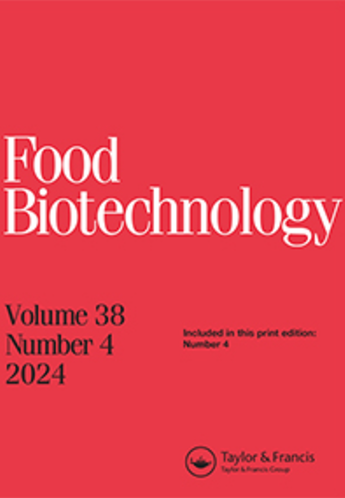Fermentative Bioconversion of β-Glucoside Like Isoflavones is a Better Indicator of β-Glucoside Hydrolysing Capability in Probiotic Lactic Acid Bacteria (LAB) Due to the Predominant Phosphoglucosidase Activity
IF 1.6
4区 农林科学
Q4 BIOTECHNOLOGY & APPLIED MICROBIOLOGY
引用次数: 0
Abstract
ABSTRACT Isoflavones provide multiple health benefits, such as the potential for prevention of cancer and osteoporosis. Isoflavones are naturally present as β-glucosides, rendering them unavailable for uptake in the human gut. In the present study, an attempt was made to understand the mechanism of β-glucoside hydrolysis by probiotic microbes. Six major probiotic-type strains were screened for β-glucosidase activity, and two annotated β-glucosidase genes were cloned and characterized from L. acidophilus. These proteins were more active on phosphorylated pNPG than on pNPG, indicating a Phosphoenolpyruvate (PEP)-dependent pathway involving phosphoglucosidase for the uptake and metabolism of β-glucosides such as isoflavones. The screening of these strains for the bioconversion of isoflavones showed above 90% isoflavone glucoside hydrolysis for four strains, with L. rhamnosus showing the highest hydrolysis. To the best of our knowledge, this is the first report comparing glucoside hydrolysis by whole bacterial cells with cell extracts and purified candidate proteins.β-葡萄糖苷类异黄酮的发酵生物转化是益生菌(LAB)中β-葡萄苷水解能力的更好指标,因为其具有主要的磷酸葡萄糖苷酶活性
摘要:异黄酮具有多种健康益处,如预防癌症和骨质疏松症的潜力。异黄酮以β-葡萄糖苷的形式天然存在,使其无法在人体肠道中吸收。本研究试图了解益生菌水解β-葡萄糖苷的机理。从嗜酸乳杆菌中筛选出6个主要的益生菌型菌株的β-葡萄糖苷酶活性,并克隆和鉴定了两个注释的β-葡糖苷酶基因。这些蛋白质在磷酸化的pNPG上比在pNPG更具活性,表明磷酸烯醇丙酮酸盐(PEP)依赖性途径涉及磷酸葡萄糖苷酶,用于摄取和代谢β-葡萄糖苷,如异黄酮。对这些菌株进行异黄酮生物转化的筛选显示,四个菌株的异黄酮-葡萄糖苷水解率超过90%,其中鼠李糖乳杆菌的水解率最高。据我们所知,这是第一份将全细菌细胞水解葡萄糖苷与细胞提取物和纯化的候选蛋白质进行比较的报告。
本文章由计算机程序翻译,如有差异,请以英文原文为准。
求助全文
约1分钟内获得全文
求助全文
来源期刊

Food Biotechnology
工程技术-生物工程与应用微生物
CiteScore
3.80
自引率
0.00%
发文量
15
审稿时长
>12 weeks
期刊介绍:
Food Biotechnology is an international, peer-reviewed journal that is focused on current and emerging developments and applications of modern genetics, enzymatic, metabolic and systems-based biochemical processes in food and food-related biological systems. The goal is to help produce and improve foods, food ingredients, and functional foods at the processing stage and beyond agricultural production.
Other areas of strong interest are microbial and fermentation-based metabolic processing to improve foods, food microbiomes for health, metabolic basis for food ingredients with health benefits, molecular and metabolic approaches to functional foods, and biochemical processes for food waste remediation. In addition, articles addressing the topics of modern molecular, metabolic and biochemical approaches to improving food safety and quality are also published.
Researchers in agriculture, food science and nutrition, including food and biotechnology consultants around the world will benefit from the research published in Food Biotechnology. The published research and reviews can be utilized to further educational and research programs and may also be applied to food quality and value added processing challenges, which are continuously evolving and expanding based upon the peer reviewed research conducted and published in the journal.
 求助内容:
求助内容: 应助结果提醒方式:
应助结果提醒方式:


